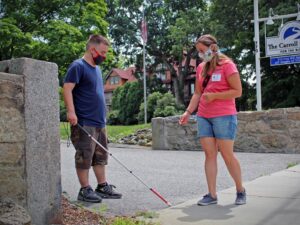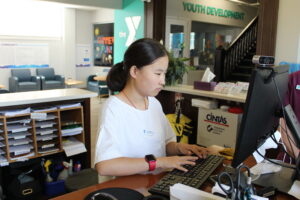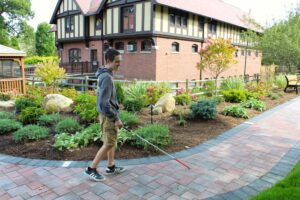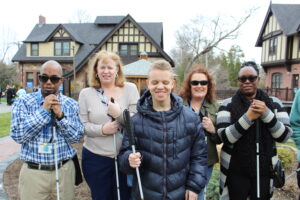Vocational Transition Program
Build Confidence. Gain independence. Prepare for success.
For decades, our Vocational Transition Program has helped thousands of young adults who are blind or visually impaired build the skills to navigate daily life with confidence and succeed in college and in the workplace. If you’re ready to take the next step, the Vocational Transition Program at The Carroll Center for the Blind is designed for you.
In this 20-week residential program, our expert team of vision professionals will provide the skills, training, technology, and support you need to live more independently and with confidence. Whether you’re preparing to pursue employment, college, or both, you’ll receive personalized instruction and practical tools to build a more independent future!
Not sure if you’d benefit from training at the Carroll Center? Complete our short questionnaire, and our team will help you explore your next steps to find the right path forward.
Maddie B.
“The Carroll Center introduced me to the blind community. It gave me blind adult role models to follow, people who showed me what’s possible.
Program Benefits
- Personalized Instruction: Receive comprehensive training based on your current skills and goals.
- Expert, Caring Instructors: Learn from certified professionals who are highly trained, compassionate, and deeply committed to your success.
- Community: Build lifelong connections with peers who understand the journey of vision loss. Room and board are provided for eligible participants.
- Technology You Keep: Receive a free laptop with personalized assistive technology—yours to keep after graduation.
- Ongoing Tech Support: Stay connected and confident with on-demand virtual tech support during and after the program.
- Real-World Readiness: Build essential skills needed for successful employment and greater independence.
- Continued Learning: Return for no-cost refresher training (space permitting).
What You’ll Learn
You’ll work one-on-one and in group settings with our experienced team to build the essential skills needed for employment and independent living, including:
- Orientation & Mobility: Learn to travel safely indoors and outside, navigate public transit, unfamiliar routes, and college/workplace settings independently.
- Technology Proficiency: Explore adaptive tools to use computers, tablets and mobile devices independently for personal, college, and work tasks.
- Daily Living Skills: Learn adaptive methods to complete daily living tasks and independently manage your home, school and work environments.
- Adjustment and Self-Advocacy: Receive counseling and support to build confidence and enable you to advocate for yourself within your family, community, college, and workplace.
- Social & Communications Skills: Build effective communication strategies for interacting with peers, professors, and coworkers, learn professional behavior, dress codes, teamwork, and punctuality.
- Time Management & Organization: Learn to stay organized with accessible calendars and task-tracking tools.
- Workplace & College Readiness: Learn to use adaptive tools to manage daily routines and schedules, complete tasks independently, build a resume, search and apply for jobs, while identifying the tools and accommodations you need to be successful.
Assessment and Individualized Planning
All clients participating in our 20-week residential Vocational Transition Program begin with a 2-week comprehensive assessment on the Carroll Center for the Blind campus in Newton, MA. This allows our team to better understand your current skills and goals, and determine how we can best support your success throughout the program. Based on this assessment, our team develops an individualized instructional plan, ensuring each client gets the support they need to grow.
Get Started
Whether you’re returning to work, changing career paths, or just beginning your journey after vision loss, our Vocational Transition Program can help you regain confidence and independence to achieve your goals.
Not sure if you’d benefit from training at the Carroll Center? Complete our short questionnaire, and our team will help you explore your next steps to find the right path forward.









